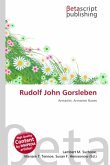Please note that the content of this book primarily consists of articles available from Wikipedia or other free sources online. Perchta or Berchta (English: Bertha), also commonly known as Percht and other variations, was once known as a goddess in Southern Germanic paganism in the Alpine countries. Her name means "the bright one" (Old High German beraht, bereht, from a Common Germanic berhto-, ultimately root-cognate to Latin flagrare "blaze", flamma "flame") and is probably related to the name Berchtentag, meaning Epiphany. Perchta is often identified as stemming from the same Germanic goddess as Holda and other female figures of German folklore (see Frija-Frigg). According to Jacob Grimm and Lotte Motz, Perchta is Holda''s southern cousin or equivalent, as they both share the role as a "guardian of the beasts" and come during the Twelve Days of Christmas when they check on the spinning. In some descriptions, Perchta has two forms, she may appear either as beautiful and white as snow like her name, or elderly and haggard.
Bitte wählen Sie Ihr Anliegen aus.
Rechnungen
Retourenschein anfordern
Bestellstatus
Storno








